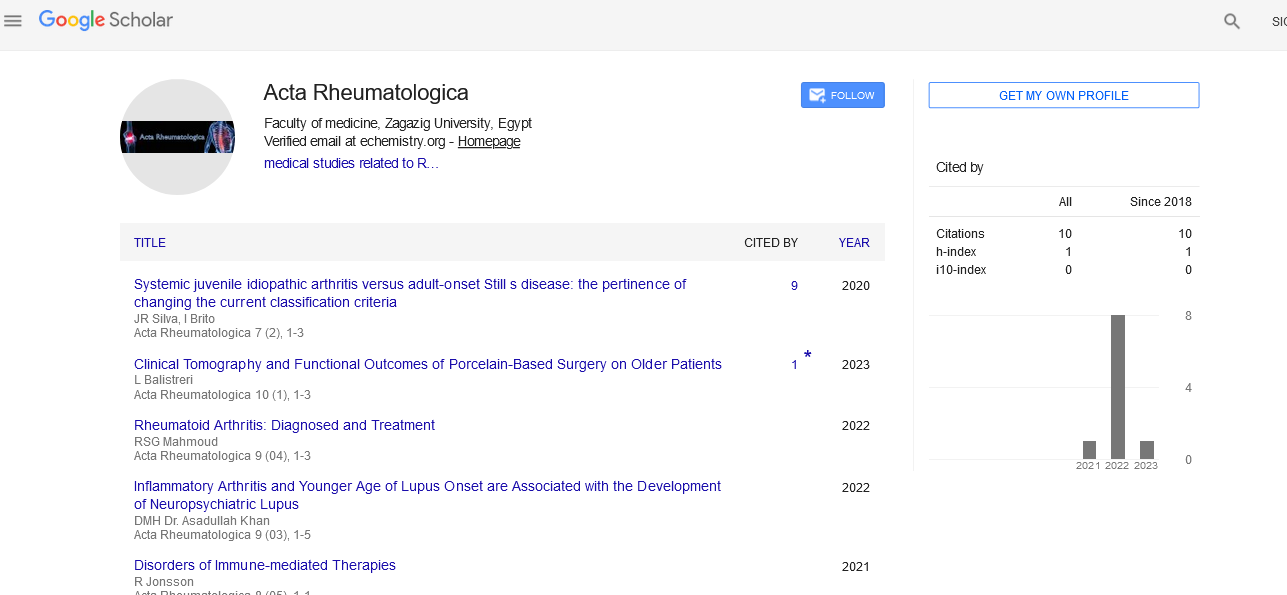Perspective - (2024) Volume 11, Issue 3
Deciphering the Flames Within: Understanding and Conquering Inflammatory Diseases
Yasser Emad*
Department of Rheumatology, Zagazig University, Zagazig, Egypt
*Correspondence:
Yasser Emad, Department of Rheumatology, Zagazig University, Zagazig,
Egypt,
Email:
Received: 11-May-2024, Manuscript No. IPAR-24-14799;
Editor assigned: 14-May-2024, Pre QC No. IPAR-24-14799 (PQ);
Reviewed: 29-May-2024, QC No. IPAR-24-14799;
Revised: 06-Jun-2024, Manuscript No. IPAR-24-14799 (R);
Published:
14-Jun-2024
Introduction
Inflammatory diseases constitute a diverse group of disorders
characterized by dysregulated immune responses, culminating in
tissue inflammation, damage, and dysfunction. From the fiery
throes of rheumatoid arthritis to the silent inflammation of
cardiovascular disease, these conditions exact a profound toll on
global health and well-being. In this article, we embark on a
journey through the intricate landscape of inflammatory
diseases, elucidating their underlying mechanisms, clinical
manifestations, diagnostic approaches, treatment modalities,
and avenues for ongoing research and innovation.
At the heart of inflammatory diseases lies the body's immune
system, a finely tuned defense mechanism designed to combat
pathogens and maintain tissue homeostasis. Inflammation, a
fundamental component of the immune response, serves as a
double-edged sword, orchestrating host defense while
underpinning the pathogenesis of various diseases. Immune
cells, including macrophages, neutrophils, and lymphocytes,
release an arsenal of cytokines, chemokines, and inflammatory
mediators in response to tissue injury or infection, initiating a
cascade of cellular and molecular events that amplify and
perpetuate inflammation.
Description
Rheumatoid arthritis: Unraveling the molecular
orchestra of autoimmunity
Rheumatoid Arthritis (RA) stands as a paradigmatic autoimmune
inflammatory disease, characterized by chronic synovial
inflammation, joint destruction, and systemic manifestations.
Autoantibodies, such as rheumatoid factor and anti-citrullinated
protein antibodies, drive immune dysregulation, triggering
aberrant immune responses against self-antigens. The synovium,
a dynamic tissue lining the joint capsule, undergoes hyperplasia
and infiltration by immune cells, perpetuating local inflammation
and cartilage erosion. Targeted therapies, including biologic
agents and small molecule inhibitors, have revolutionized RA
management, offering unprecedented efficacy in dampening
inflammation and preserving joint function.
Inflammatory bowel disease: Navigating the storms
of gut inflammation
Inflammatory Bowel Disease (IBD), comprising Crohn's disease
and ulcerative colitis, represents chronic inflammatory disorders
of the gastrointestinal tract, characterized by mucosal
inflammation, epithelial damage, and dysregulated immune
responses. Genetic susceptibility, environmental triggers, and
dysbiosis of the gut microbiota contribute to IBD pathogenesis,
fueling a relentless cycle of inflammation and tissue injury.
Treatment paradigms for IBD encompass a spectrum of
pharmacological agents, including immunomodulators and
biologic therapies, tailored to disease severity and patient
response.
Psoriasis: Unveiling the skin's inflammatory tapestry
Psoriasis, a chronic immune-mediated inflammatory skin
disorder, manifests as erythematous plaques, silvery scales, and
pruritus, affecting millions worldwide. Dysregulation of the
immune system, particularly T cell-mediated responses, drives
epidermal hyperproliferation, aberrant differentiation, and
inflammatory cytokine production. While topical therapies
provide symptomatic relief, systemic agents targeting key
immunological pathways, such as tumor necrosis factor-alpha
and interleukin-17, offer potent alternatives for moderate to
severe psoriasis, heralding a new era of precision medicine in
dermatology.
Cardiovascular inflammation: The silent fire of
atherosclerosis
Atherosclerosis, the underlying cause of cardiovascular
disease, represents a chronic inflammatory process
characterized by endothelial dysfunction, lipid accumulation,
and plaque formation within arterial walls. Inflammatory
mediators, including cytokines, chemokines, and adhesion
molecules, orchestrate leukocyte recruitment, foam cell
formation, and vascular remodeling, driving disease progression
and thrombotic complications. Targeted interventions aimed at
mitigating vascular inflammation, such as statins and anti-inflammatory
agents, hold promise for reducing cardiovascular
events and improving outcomes in high-risk populations.
Emerging therapeutic paradigms and future directions
The landscape of inflammatory disease therapeutics is
undergoing rapid evolution, propelled by advances in
immunology, molecular biology, and precision medicine. Biologic
agents targeting specific cytokines and immune pathways offer
unprecedented efficacy in controlling inflammation and halting
disease progression across diverse inflammatory conditions.
Moreover, novel approaches, including gene editing, cell-based
therapies, and microbiota-targeted interventions, hold promise
for personalized and regenerative medicine, ushering in a new
era of transformative therapies with the potential to reshape the
treatment landscape of inflammatory diseases.
Conclusion
Inflammatory diseases represent a formidable challenge with
multifaceted implications for individuals, families, and healthcare
systems worldwide. By unraveling the molecular intricacies of
inflammation, embracing multidisciplinary approaches to disease
management, and fostering innovation and collaboration, we
can stride towards improved outcomes and enhanced quality of
life for individuals grappling with these debilitating conditions.
As we navigate the complex terrain of inflammatory diseases,
armed with knowledge, empathy, and scientific ingenuity, we
forge a path towards a future where inflammation is subdued,
and individuals thrive in health and vitality.
Citation: Emad Y (2024) Deciphering the Flames Within: Understanding and Conquering Inflammatory Diseases. Acta Rheuma Vol:11 No:3





